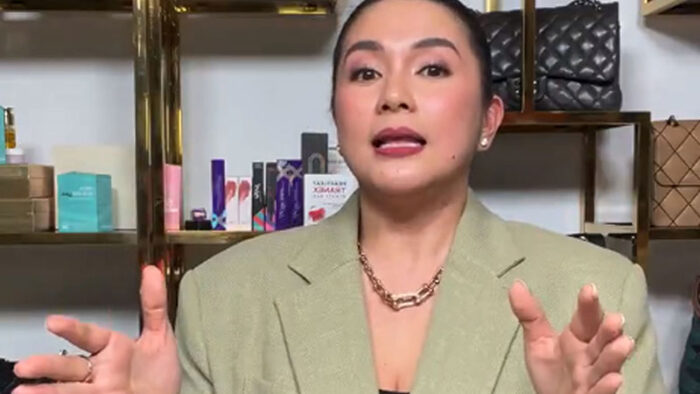Mariel Padilla on Senate procedure: It’s Vitamin C, not gluta
Actress and television host Mariel Padilla, who drew flak for posting a photo while she was receiving what appeared to be cosmetic treatment in her husband Sen. Robinhood Padilla’s office last week, has apologized “to all concerned,” saying she never intended “to malign nor undermine the integrity and dignity of the Senate.”
She also claimed that what she received was actually a Vitamin C drip, not glutathione, as earlier reported, adding that the procedure was done under the medical supervision of a nurse.
“I want to extend my sincerest apologies to all concerned, including the members and staff of the Senate and the public. We uphold the Senate’s dignity and integrity,” she said in a statement posted on her husband’s official Facebook account on Sunday.
“[M]y intent was just to inspire others that even amidst various activities or wherever they are, they can still prioritize their health by taking vitamins,” Padilla said.
According to the celebrity, she was in the Senate that day to show support for her husband following the passage of the Eddie Garcia bill, which seeks to promote and protect the welfare of film and TV production workers.
Second DOH statement
“Despite my busy schedule as a wife, mother and online seller, I wanted to be there with him since his work is very important to him,” said Padilla.
Sen. Nancy Binay, chair of the Senate ethics committee, earlier remarked that undergoing glutathione therapy was not appropriate “in a government building like the Senate,” as she called on all visitors to observe “proper decorum” in the Senate.
Glutathione is a compound believed by many to have skin-lightening properties. But the Department of Health (DOH)warned anew on Saturday that this might cause serious side effects in the absence of clinical studies.
Padilla never mentioned glutathione in her now-deleted Instagram post on Feb. 19, but she said about her procedure in her husband’s office: “I never miss a drip because it really helps in so many ways—collagen production, whitening, energy, metabolism, immunity and much more.”
Despite Padilla’s clarification, the DOH issued another statement on Sunday stressing that it “categorically states that there are no published clinical trials that have evaluated the use of injectable glutathione for skin lightening.”
“Injectable glutathione is sometimes paired with intravenous Vitamin C. Vitamin C injection may form kidney stones if the urine is acidic,” the DOH said, citing the Food and Drug Administration’s (FDA) Circular No. 2019-182.
“Large doses of Vitamin C have resulted in hemodialysis in patients with glucose-6-phosphate dehydrogenase (G6PD) deficiency,” warned the department.
The DOH noted that once the FDA has approved a prescription drug for entry into the Philippine market, “neither the DOH itself nor the FDA can regulate the practice of doctors who will be prescribing those drugs for their patients.”
‘Medical negligence’
The DOH also noted that the Philippine Medical Association may admonish members who are found to have recommended the off-label drug use of injectable glutathione for violating its Code of Ethics.
The agency urged those who believe they were wrongly prescribed injectable glutathione and other drugs to consult with a lawyer “for legal advice on matters such as medical negligence and what may be done in the interest of justice.”
It also advised people experiencing side effects due to injectable glutathione and other chemicals to seek medical attention and to report to the FDA by emailing pharmacovigilance@fda.gov.ph or via online reporting through its website: www.fda.gov.ph.
They may also contact the Center for Drug Regulation and Research of the FDA at telephone No. (02) 8809-5596. INQ
